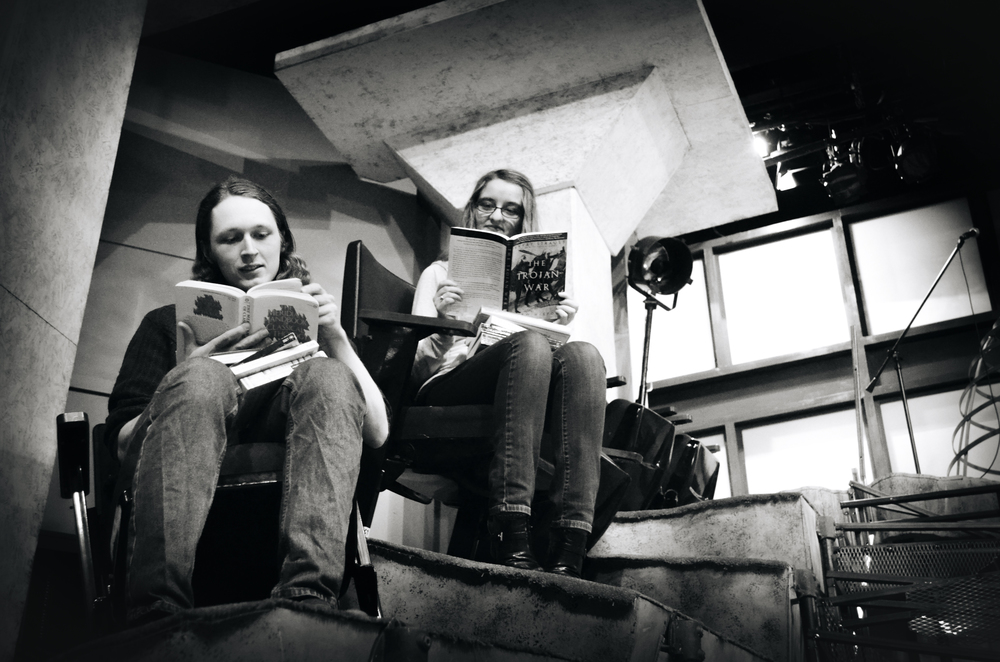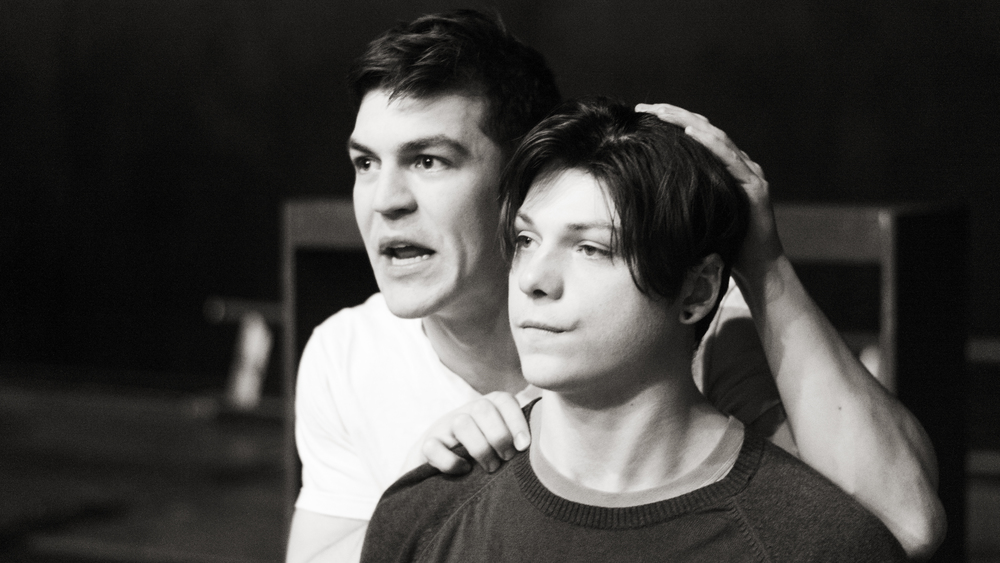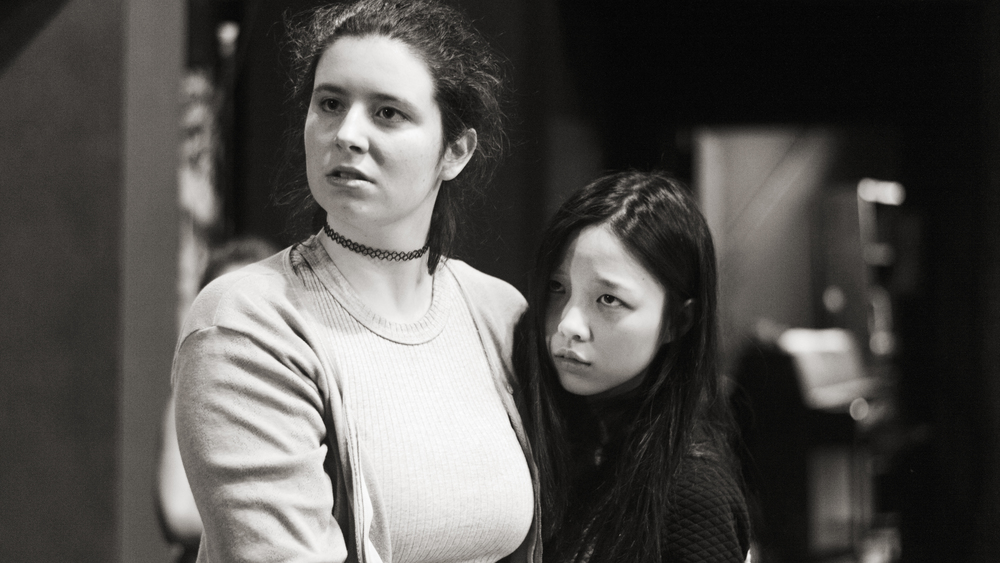
Nick Graver ’16 and Francesca Parker ’17 on the set of Hecuba. Photo: Gabe Cohn ’16
A People’s History of the Trojan War
BY: KALLAN DANA ’19
Midway through our interview, I ask Hecuba dramaturges Nick Graver ’16 and Francesca Parker ’17 how they’ve been available as resources to actors throughout the show’s development. Just as they’re beginning to respond, one of Hecuba’s eighteen actors swoops into the room, asking with nervous energy if he can meet with the two of them to talk about his character. Graver and Parker both laugh, somewhat surprised, but agree to meet after the interview.
This sort of a spur-of-the-moment question could occur at any point for this production’s adept dramaturges. They need to be ready and willing at all times to guide the actors in useful directions for character research. “We’re dealing with smart college students,” notes Graver, “The standard Wikipedia summary is something that every actor has found for themselves. We’re there to help on a more advanced level.”

Karen Hafter ’19 and Zoe Lesser ’19 in rehearsal for Hecuba. Photo: Dante Haughton ’19
This “advanced level” is where Graver and Parker can really shine. They’ve put a significant amount of time and effort into understanding the nuances of not only Marina Carr’s adaptation of the Hecuba myth, but also of a plethora of other related texts, both Greek and modern. Graver and Parker began by focusing on the Homeric works, rereading the Iliad and the Odyssey in order to have a clear foundation for the world of Hecuba, which takes place in between these two epics.
Director Ian Belton’s unusual rehearsal process presented Graver and Parker with further opportunities and challenges. The team did not begin the rehearsal process with Marina Carr’s text, but instead blocked and performed the entirety of Anne Carson’s translation of the original Euripides version. “As dramaturges we would have been confused if we [had] tried to jump into Carr’s version [without reading Carson’s text],” comments Graver. Parker agrees, suggesting that a thorough understanding of the older version of the myth “helps make the show make sense to the actors so that they can convey the story to the audience.”
One of the key themes of this adaptation of Hecuba’s story is the contradictory and varied nature of history and storytelling. Both Parker and Graver were cognizant that there is more than one side to every story, and understood that they needed to have an understanding of all the different accounts and perspectives of the characters in Hecuba, rather than just the most common narrative. They read not only the popular Homeric myths and the original Euripides-authored text of Hecuba, but also read plays by other ancient Greek authors, modern adaptations of Greek and Roman myths, and more. In several cases, characters change drastically depending on the source, which is where the dramaturgical knowledge comes in. Graver states that in such a case, he tries to give the actor all the character information they need while still allowing them to choose to follow whichever account of the character they feel is most appropriate. He also points out that Ovid’s Metamorphoses includes a section on Hecuba that is in many ways the “standard version” of the myth. Marina Carr’s retelling pushes back against this traditional narrative.

Will Clark ’16 and Jack Mulhern ’16. Photo: Dante Haughton ’19Will Clark ’16 and Jack Mulhern ’16. Photo: Dante Haughton ’19
In Parker’s eyes, this resistance to conform to the traditional portrayal of Hecuba is exactly what makes Carr’s adaptation so important and worthwhile. Parker labels Carr’s text as a “feminist approach” to the myth, which manages to “humanize Hecuba [without] victimizing her.” Graver adds: “Because these stories are basically the oldest stories we have in Western literature…Marina Carr’s [willingness] to tell a completely different story in a modern context is very bold.”
What makes Carr’s story different? Parker pinpoints the fact that her play “tells the story from the perspective of the people who suffered the most, and not the victors.” This is subversive and unique on two levels. Firstly, the audience can look at the famous characters in new a light, as Parker found herself doing after researching different narratives about Odysseus and realizing “how much literature shows [him] as an asshole.” She began to notice how morally grey some of these big-name mythic figures become when viewed through a different perspective. On a more macrocosmic level, though, Hecuba’s perspective shift encourages the audience to look at contemporary portrayals of war and of our country’s involvement in wars, and to ask ourselves what our own culpability is. “It’s easy to think of ourselves as the good guys,” Graver suggests, “But the play helps us to be aware that we’re the ones telling the story.”

Annabele Vaës ’19 and Wanjun Chen ’19. Photo: Dante Haughton ’19
Talking to Graver and Parker, I get the sense that they have enough knowledge and understanding of the show and its historical background to speak on it for hours. Their extensive research on Hecuba’s story is a remarkably impressive feat considering the expansiveness of this adaptation, but underneath the strong analytical work both dramaturges have done there lies a clear passion for this version of the narrative and all it represents: a feminist perspective, a metaphor for American involvement in war—in short, a rewriting of a history.
***
Performances of Hecuba continue through Sunday, April 17th. For ticketing information, click HERE.
Kallan Dana is a first-year and a staff writer for the Living Newsletter.
